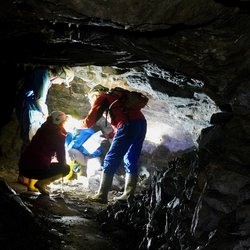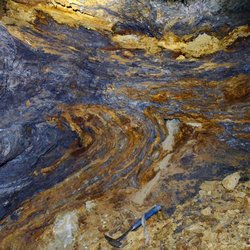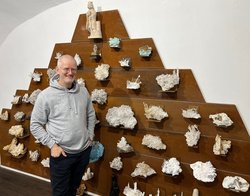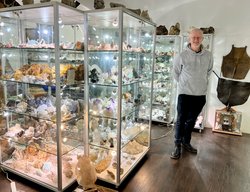Planned Schedule
• Pre-conference Excursion A: Arzberg Historic Pb-Zn mine
• Pre-conference Excursion B: Mineral collection R. Pomberger; 1/2 day
• Ice breaker party, evening
• Official conference opening
• Scientific sessions (oral, posters)
• Public lecture, evening
• Conference dinner, evening
• Scientific sessions (oral, posters)
• Closing ceremony, afternoon
• Bruker workshop on XRD and XRF
Invited and Public Lectures
Invited lectures will be integral part of the program. Speakers and titles will be announced in the third circular.
The public lecture on "Katzengold & Silberfisch" will be given by Dr. Robert Krickl (Brunn am Gebirge).
The Society for Geology Applied to Mineral Deposits (SGA) kindly sponsors an invited keynote talk given by Dr. Manuel Keith, GeoZentrum Nordbayern, "Unravelling magmatic-hydrothermal processes by mineral micro-analysis”.
Scientific Sessions
Session 1: Mineralogy and Crystallography - a Modern Perspective
Conveners: Tamara Đorđević, University of Vienna; tamara.djordjevic(at)univie.ac.at
Ronald Bakker, Montanuniversität Leoben; ronald.bakker(at)unileoben.ac.at
This session will focus on the transformative role of modern analytical techniques in advancing the frontiers of mineralogy and crystallography. Methods such as electron diffraction, synchrotron studies, transmission electron microscopy (TEM) have revolutionized our ability to study minerals at unprecedented scales and resolutions. These techniques provide critical insights into complex phenomena such as defect structures, phase transitions, and the nanoscale behavior of minerals, offering new perspectives on long-standing scientific questions.
The application of these state-of-the-art methods extends beyond pure mineralogical research. They are increasingly being used in environmental studies, where understanding the interactions between minerals and their environment is crucial to addressing issues such as pollution remediation, carbon sequestration and resource recovery. Spectroscopic techniques, including Raman and X-ray absorption spectroscopy, complement these tools by providing powerful means to probe chemical compositions, electronic states and bonding environments in minerals.
We warmly encourage master’s and PhD students to attend this session. Whether you are just beginning your research journey or seeking inspiration for advanced studies, this session will provide valuable insights, foster meaningful connections, and serve as an excellent platform for exchanging ideas with leading experts in the field. Your participation and fresh perspectives are not only encouraged but highly valued.
Session 2: Mineral Raw Materials
Conveners: Phillip Gopon, Montanuniversität Leoben; phillip.gopon(at)unileoben.ac.at
Clifford Patten, University of Innsbruck; clifford.patten(at)uibk.ac.at
With the rapid de-carbonization of our infrastructure, the world is facing a raw materials shortage to achieve the energy transition. This session will focus on raw materials, with a particular focus on those raw materials necessary for the energy transition, i.e. critical raw materials. Any contributions dealing with raw materials and/or the processes that form ore deposits are welcome. These might include the economics of raw materials or hydrothermal, orogenic, magmatic, and/or sedimentary processes. Those abstracts dealing with critical metals, and particularly critical metal deposits in Europe are especially welcome.
Session 3: Applied and Environmental Mineralogy
Conveners: Martin Dietzel, Technical University Graz; martin.dietzel(at)tugraz.at
Ferdinand Hampl, Montanuniversität Leoben; ferdinand.hampl(at)unileoben.ac.at
This session invites contributions on the broad and dynamic field of Applied and Environmental Mineralogy, encompassing both classical and cutting-edge topics. We encourage submissions addressing industrial and (geo)chemical applications of mineralogy, such as contributions on glass/refractory/processing materials, tailored mineral nucleation/growth, clay mineralogy, natural and artificial building stones, (low-carbon) cements, mineral carbonation / carbon sequestration, mineral-based solutions for environmental pollution and remediation, waste disposal and treatment, archaeometry etc. Additional focus areas include isotope and geochemical forensics, and innovative analytical, multi-proxy and experimental approaches. By fostering interdisciplinary dialogue, this session will highlight the role of mineralogy in addressing the understanding of mineral (trans)formation kinetics and mechanisms considering industrial challenges and environmental sustainability.
Session 4: Metamorphic and Igneous Petrology
Conveners: Bastian Joachim-Mrosko, University of Innsbruck; bastian.joachim(at)uibk.ac.at
Johann Raith, Montanuniversität Leoben: johann.raith(at)unileoben.ac.at
This session focuses on recent advances in metamorphic and igneous petrology, providing a comprehensive view of the processes that shape the Earth's crust and mantle. Presentations in this session may highlight innovative experimental, analytical or modelling approaches, including high P-T experiments, geochemical and isotopic studies, phase equilibrium modelling and field-based investigations. Emphasis will also be placed on the role of petrology in unravelling tectonic processes, crust-mantle interactions, and the shallow and deep cycling of trace elements. This session aims to encourage interdisciplinary collaboration and discussion. Researchers, students and professionals interested in the mineralogical, structural and geodynamic aspects of petrology are therefore encouraged to attend.
Session 5: Chronology of Geological Processes
Conveners: Daniela Gallhofer, University of Graz; daniela.gallhofer(at)uni-graz.at
Etienne Skrzypek, University of Graz; etienne.skrzypek(at)uni-graz.at
Constraining the age or rate of a geological process involves two important steps. First, a precise and accurate analysis of the geological material has to be performed. Second, the interpretation of analytical data must consider the physico-chemical conditions at which the material formed or evolved. This is a crucial approach to turn a date into the age of a geological event. This session wishes to bring together researchers dealing with one or both aspects. The session welcomes contributions that aim at constraining the absolute age, time span or rates of various processes like magmatic activity, metamorphic reaction, pressure-temperature evolution, mineralization, mass transfer or exhumation. We particularly look forward to receiving studies about the petrogenesis of both classical and less common geochronometers. Studies dealing with analytical aspects will also be welcome.
Session 6: Environmental / Low-temperature Geochemistry
Conveners: Andre Baldermann, Technical University Graz; baldermann(at)tugraz.at
Franziska Stamm, Technical University Graz; fstamm(at)tugraz.at
The terrestrial and marine biogeochemical cycles of elements in Earth surface environments are closely coupled with the evolution of life and driven by energy and material fluxes between the atmosphere, biosphere, hydrosphere, pedosphere and lithosphere. Understanding the direction and magnitude of the complex processes that control fluxes in low-temperature settings of Earth‘s (re)active surface is key to decipher mineral/rock-fluid interactions in general and to assess various dissolution-precipitation phenomena occurring at solid-liquid interfaces from the nanoscale to the global scale. This session brings together research focused on the geochemistry and mineralogy of surface-near (sedimentary and raw mineral) deposits using field studies and laboratory-based experimental studies at various spatiotemporal resolution, as well as their integration with reaction transport and hydrochemical modeling. Themes that are covered by this session include, but are not limited to: 1) processes (e.g., weathering phenomena, global element cycles, fluid mixing, kinetics vs thermodynamics), 2) controls (e.g., climate change, ecosystems, fluid chemistry, crystal structures), 3) reactions (e.g., anthropogenic influences, pollution, element mobilization vs complexation, mineral (trans)formation in aqueous systems) and 4) approaches (e.g., isotopes and tracers, in-situ analysis, modelling, novel methods). We also attempt to find synergies with other proposed sessions.
Session 7: Analytical and Experimental Methods
Conveners: Róbert Arató, Montanuniversität Leoben, robert.arato(at)unileoben.ac.at
Dominik Sorger, University of Göttingen, dominik.sorger(at)uni-goettingen.de
Thomas Meisel, Montanuniversität Leoben, thomas.meisel(at)unileoben.ac.at
This session invites submissions from the broad field of experimental methods and geoanalytics. We welcome studies related to mineralogical and/or geochemical experiments, which aim at a better understanding of geological systems. We also invite contributions about the detailed analysis of mineralogical-geochemical systems via various analytical tools, which can include (but should not be restricted to) Raman- and IR spectroscopy, (LA)-ICP-MS, LIBS as well as electron-beam and X-Ray-based techniques and any combination of these. We welcome submissions focusing on fundamental geochemical questions but also on applied approaches dealing with raw material-related and society-related challenges. Studies at all stages from experiment planning to data analysis, and methodological development at any stage, are invited encompassing a broad spatial range from micro to global scale.
Session 8: Open Session
Conveners: Viktor Bertrandsson Erlandsson, Montanuniversität Leoben, viktor.erlandsson(at)unileoben.ac.at
This Open Session invites researchers from various fields related to mineralogy and/or petrology to present and discuss their latest work and exchange ideas across disciplines. Whether you are exploring new theoretical frameworks, applying novel methodologies, or addressing pressing challenges, this session provides a platform for diverse perspectives and groundbreaking research.
We encourage contributions from all areas of mineralogy and petrology, as well as from interdisciplinary projects that bridge gaps between fields, which do not fit to the other, typical, established sessions.
Excursion A: Arzberg Historic Pb-Zn mine and cheese tasting
Saturday 20 September 2025, one day excursion
Guides: Frank Melcher, Annika Geringer
Costs: € 35.-; includes entrance fees, transport and cheese tasting (drinks are not included).
Maximum number of participants: 16 (!); first come first serve!
The one-day excursion will focus on SEDEX type Pb-Zn-(Ag) deposits in the Graz Paleozoic with a visit to the historic mine at Arzberg. The visit to the Schaustollen of Almenland Stollenkäse Gmbh with cheese tasting is included.
The Arzberg deposit is the type locality of the "lead-zinc barite district of the Graz Paleozoic - Schönberg Formation (Arzberg)”. These stratiform SEDEX-type deposits formed in the Upper Silurian to Lower Devonian due to rifting.
In the Arzberg mine a lower sulfide- and an upper sulfate-dominated ore horizon are developed. The thickness of these horizons varies in the decimeter to meter range. The ore deposits are linked to a channel structure several tens of meters wide and several hundred meters long. The channel-axis is W-E orientated. Both horizons are cut by several N-S striking and eastward trending faults. More results of an ongoing scientific re-investigation in the MRI project scheme will be presented.
Mining activities began in the early Middle Ages, probably supplying the Graz Mint. After several interruptions, mining reached its peak in the 18th century but came to an end in the 1920s. Exploration work in this area in the 1970s yielded only few encouraging results.
The excursion will include a visit to the Arzberg mine, where the sulfide and sulfate ore horizons as well as the tectonic and metamorphic overprint can be observed. Selected stops in the surrounding area will illustrate the stratigraphy, and a tasting of the “Arzberger Stollenkäse” cheese will complete the excursion with a culinary experience.
Excursion B: Mineral collection R. Pomberger, Eisenerz
Sunday 21 September 2025, half-day excursion
Guide: Roland Pomberger
Costs: € 10.-; includes transport costs
Maximum number of participants: 7 (!); first come first serve!
Professor Dr. Roland Pomberger hosts one of the best private mineral collections in Austria located on his premises in Eisenerz. He agreed to open his collection – it is normally not open to the public – to a small group of participants of MinPet 2025.
Austrian mineral localities are the focus of his collection, e.g., top-quality and historic specimens from Erzberg, Oberdorf an der Laming, Bleiberg, etc. but also outstanding findings of Alpine minerals.
Leoben guided city tour
Sunday 21 September 2025, ca. 1.5-2 hours tour in the afternoon
Guide: Sophie Zeiler-Mahrous
Language: german/english
Costs: € 15.-
Minimum number of participants: 10 (!)
A sightseeing tour through the city center of Leoben. The tour guide gives exciting insights into the architecture and history of the city of Leoben. Special features of the “Montanstadt” Leoben, with its architectural witnesses are explained in their historic context. The historic growth of the down-town campus buildings of Montanuniversität Leoben are also highlighted.
Your guide, the renowned and popular Austria Guide Sophie Zeiler-Mahrous, is known for her expertise in culture, history and cuisine throughout Austria. She is looking forward to welcoming you to this special tour.
Workshop: Röntgendiffraktometrie (XRD) & Röntgenfluoreszenzanalyse (XRF) im Anschluss an die MinPet 2025 - Leoben
Die Sprache des Workshops ist deutsch. Please note that the workshop language is German.
Im Anschluss an die MinPet 2025 in Leoben laden wir Sie herzlich zu unserem zweitägigen Workshop zur Röntgendiffraktometrie (XRD) und Röntgenfluoreszenzanalyse (XRF) ein. Dieser Workshop bietet eine fundierte Einführung in die Methoden, praktische Anwendungen sowie die Auswertung und Interpretation von Messergebnissen.
Datum:
24.09.2025 – Röntgendiffraktometrie (XRD)
25.09.2025 – Röntgenfluoreszenzanalyse (XRF)
Ort: Montanuniversität Leoben
- Die Teilnehmerzahl ist begrenzt! Bitte melden Sie sich frühzeitig an, um sich einen Platz zu sichern. Bitte beachten Sie, dass der Workshop nur stattfinden kann, wenn eine Mindestanzahl an Teilnehmenden erreicht wird.
- Kosten: Die Teilnahme am Workshop ist kostenlos.
- Verpflegung: Alle Kaffeepausen, das Mittagessen sowie ein gemeinsames Abendessen werden von Bruker AXS übernommen.
Tag 1:Röntgendiffraktometrie (XRD) – 24.09.2025
09:00 – 09:15 Uhr | Willkommen & Vorstellung
09:15 – 10:00 Uhr | Grundlagen der PXRD
10:00 – 10:45 Uhr | Vorstellung des D6 PHASER
10:45 – 12:00 Uhr | Probenpräparation und Messstrategie
12:00 – 13:00 Uhr | Mittagessen
14:00 – 15:30 Uhr | Phasenidentifizierung mit DIFFRAC.EVA
15:30 – 17:00 Uhr | Phasenquantifizierung mit DIFFRAC.TOPAS
19:00 – 22:00 Uhr | Abendveranstaltung
Tag 2:Röntgenfluoreszenzanalyse (XRF) – 25.09.2025
09:00 – 09:15 Uhr | Willkommen & Vorstellung
09:15 – 10:00 Uhr | Grundlagen der RFA
10:00 – 10:45 Uhr | Probenpräparation für die RFA
10:45 – 12:00 Uhr | Quantitative & standardlose Analytik
12:00 – 13:00 Uhr | Mittagessen
14:00 – 15:00 Uhr | Auswerten/Erstellen von Kalibrierungen
15:00 – 17:00 Uhr | Auswerten standardloser Messungen
Der Workshop richtet sich an Forschende, Studierende sowie Fachkräfte aus der Industrie, die ihre Kenntnisse in diesen Analysemethoden vertiefen möchten.
Anmeldung & weitere Informationen:
Für die Teilnahme bitten wir um eine Anmeldung bis 15. August 2025. Die Plätze sind begrenzt – sichern Sie sich daher frühzeitig Ihre Teilnahme! Bei Fragen stehen wir Ihnen gerne zur Verfügung.





